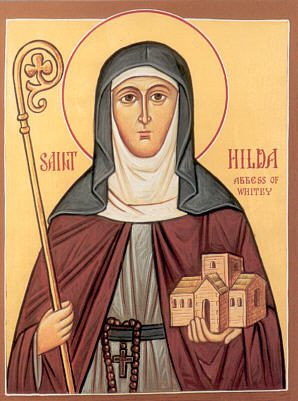I’ve been a fan of Hilda of Whitby for, well, just about forever.
She’s one of those singular figures that stand at pivot points in history and by their actions tilt the direction of whole cultures…
She was the daughter of Anglo Saxon nobility, born in 614 and raised in the court of King Edwin. When she was thirteen the court converted to Christianity, and with it Hilda.
While perhaps not the most auspicious way to enter a religion she took it all seriously and when she came of age voluntarily entered the religious life.
Her life is recounted by the Venerable Bede in his Ecclesiastical History of the English, who wrote a generation later. But she was so prominent a figure most likely what we get is largely accurate.
A practitioner of Celtic Christianity, she eventually became abbess of a mixed or double monastery including both nuns and monks at Whitby. The unsigned biographical sketch at Wikipedia says of her, “She gained such a reputation for wisdom that kings and princes sought her advice.” The Venerable himself wrote, “All who knew her called her mother because of her outstanding devotion and grace.”
She was a signal figure, the patron of Caedmon the early English poet as well as the spiritual advisor to any number of spiritual and secular figures, including kings. Five of her monks would become bishops.
So, as for that pivot moment, it was at the Synod of Whitby in 664 which was held at her monastery that the Anglo Saxon church followed the king’s desire and bowed to Roman use.
Such was her prestige it is possible to see her opposing conforming to the Roman style, rather than the Celtic. So, if she had remained true to the Celtic vision of the church, one can imagine a rather different Anglican church evolving. The mists of what might have been…
Instead she threw her lot in with the Romans. And that thread of history is what would be…
Certainly, Hilda is someone to think about, even if for a few heart beats…
She has feast days assigned to her. In the Church of England that’s today, the 19th of November. In the Roman church her feast is on the 17th, as it is in most other Anglican churches.













